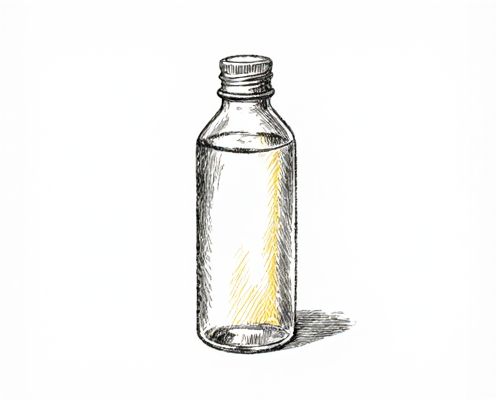
Hydrosol Illustration
Hydrosols are gentle, aromatic waters produced through the steam distillation of plants, retaining the natural essence and therapeutic properties of the source. They serve as a soothing toner, refreshing facial mist, and natural ingredient in skincare formulations, offering hydration and balancing the skin's pH. Rich in antioxidants and anti-inflammatory compounds, hydrosols help calm irritation, reduce redness, and promote a radiant complexion.
Understanding Hydrosols: A Natural Cosmetic Ingredient
Hydrosols, also known as floral waters, are the aromatic by-products of steam distillation used in natural cosmetics for their gentle, soothing properties. Rich in water-soluble plant compounds, they provide hydration and subtle fragrance while supporting sensitive skin types without irritation. You can incorporate hydrosols into your skincare routine as toners, facial mists, or refreshing sprays to enhance skin balance and nourishment.
Key Benefits of Hydrosols for Skin Health
Hydrosols contain natural floral extracts rich in antioxidants and anti-inflammatory properties that soothe and hydrate the skin, promoting a balanced complexion. Their gentle nature makes them ideal for sensitive skin, reducing redness and irritation while supporting skin barrier repair. Hydrosols also deliver essential nutrients and help regulate oil production, enhancing overall skin health and radiance.
Popular Types of Hydrosols in Women's Cosmetics
Rose hydrosol and lavender hydrosol are among the most popular types in women's cosmetics due to their soothing and anti-inflammatory properties. Chamomile hydrosol is highly favored for its calming effects on sensitive skin, while witch hazel hydrosol is prized for its astringent qualities that help minimize pores and control oil production. Neroli hydrosol is also widely used for its hydrating and rejuvenating benefits, making it a staple in facial toners and mists.
How Hydrosols Differ from Essential Oils
Hydrosols are aqueous solutions obtained through the steam distillation of plant materials, containing water-soluble compounds and trace amounts of essential oils. Unlike essential oils, which are highly concentrated and hydrophobic, hydrosols provide a gentle, diluted alternative suitable for sensitive skin and direct application without dilution. Their subtle aroma and therapeutic properties make hydrosols ideal for facial toners, body sprays, and natural skincare formulations targeting hydration and soothing effects.
Eco-Friendly Extraction Methods for Hydrosols
Hydrosols are produced through steam distillation, an eco-friendly extraction method that captures the aromatic water left after essential oils are removed from plant materials. This sustainable process uses minimal energy and water, ensuring Your skincare products remain natural and environmentally responsible. Choosing hydrosols derived from organic and renewable sources promotes a greener cosmetic routine while maintaining effective botanical benefits.
Steam Distillation: The Gold Standard for Hydrosol Production
Steam distillation remains the gold standard for hydrosol production, ensuring the extraction of pure, aromatic water from plant materials while preserving delicate therapeutic properties. This method uses controlled steam to separate essential oils and hydrosols, yielding a high-quality, naturally fragrant product free from synthetic additives. The precision of steam distillation guarantees hydrosols rich in bioactive compounds, making them highly valued in cosmetic formulations for skin hydration and soothing effects.
Safety and Purity: What to Look for in Cosmetic Hydrosols
When selecting cosmetic hydrosols, prioritize products labeled as organic and free from synthetic preservatives or additives to ensure safety and purity. Look for hydrosols derived through steam distillation from high-quality botanicals, as this method preserves the natural therapeutic properties without contamination. Confirm third-party testing or certification that guarantees the absence of harmful chemicals, ensuring the product's integrity and suitability for sensitive skin.
Top Ways to Incorporate Hydrosols into Your Skincare Routine
Hydrosols, also known as floral waters, are rich in antioxidants and natural plant essences that soothe and hydrate the skin. Using hydrosols as a toner after cleansing helps balance pH levels and refresh the skin without irritation. Incorporate hydrosol mists throughout the day for continuous hydration and use them as a base in DIY facial masks or serums to enhance their efficacy and nourishment.
DIY Cosmetic Recipes Using Hydrosols
Hydrosols, also known as floral waters, are versatile ingredients in DIY cosmetic recipes for their gentle yet effective skin benefits and natural fragrance. Incorporating rose, lavender, or chamomile hydrosols can enhance toners, facial mists, and homemade serums with soothing and anti-inflammatory properties. Using hydrosols as a base instead of regular water improves the potency and sensory appeal of lotions and masks, making them ideal for sensitive or acne-prone skin formulations.
Future Trends: Hydrosol Innovations in Women’s Beauty Products
Emerging hydrosol innovations in women's beauty products emphasize enhanced bioavailability and targeted skin benefits through advanced extraction techniques like cold-pressing and ultrasonic waves. Integration of rare botanicals and synergistic blends aims to address diverse skin concerns such as hyperpigmentation, hydration, and anti-aging with natural, sustainable formulations. Smart packaging with micro-dosage delivery systems also enhances product efficacy and consumer convenience, shaping the future of hydrosol-based skincare.
 womendy.com
womendy.com